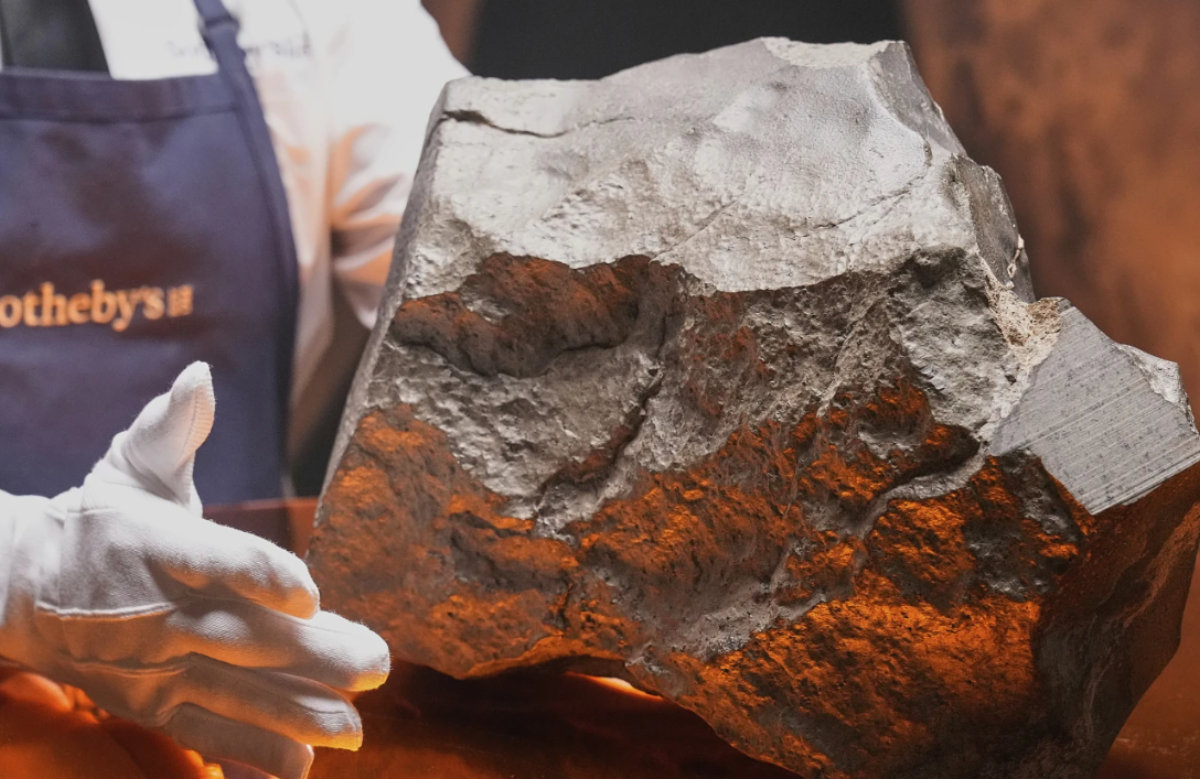A rare Martian meteorite weighing 54 pounds (25 kilograms) is heading to auction this Wednesday at Sotheby’s in New York. With an estimated value between $2 million and $4 million, it’s the largest known piece of Mars ever discovered on Earth.
Known as NWA 16788, the Martian rock will be showcased alongside a juvenile Ceratosaurus skeleton during a natural history-themed sale. The auction is part of Sotheby’s Geek Week 2025, which features 122 remarkable items including meteorites, fossils, and rare minerals.
Sotheby’s says the Martian meteorite was likely ejected from the planet’s surface by a massive asteroid impact, traveled roughly 140 million miles (225 million kilometers), and eventually landed in the Sahara Desert. It was found in Niger in November 2023 by a meteorite hunter.
Measuring nearly 15 x 11 x 6 inches (375 x 279 x 152 mm), this specimen is about 70% larger than any other known Martian fragment on Earth and accounts for nearly 7% of all Martian material on the planet. According to Cassandra Hatton, Sotheby’s vice chairman for science and natural history, this discovery far exceeds the size of previous finds.
To confirm its Martian origin, a small sample of the meteorite was sent to a specialized lab. Scientists determined it’s an olivine-microgabbroic shergottite—a type of Martian rock formed through slow magma cooling. Its coarse-grained texture contains minerals like pyroxene and olivine. A glassy surface, likely the result of intense atmospheric entry heat, helped identify it as a space rock.
Previously, the meteorite was exhibited at the Italian Space Agency in Rome. Its exact fall date remains unknown, but lab analysis indicates it likely struck Earth recently.
Another highlight of the auction is a juvenile Ceratosaurus nasicornis skeleton, standing over 6 feet (2 meters) tall and nearly 11 feet (3.3 meters) long. Unearthed in 1996 at Wyoming’s Bone Cabin Quarry—a rich site for dinosaur fossils—it consists of nearly 140 fossil bones, completed with sculpted material and mounted for display.
Dating back to the late Jurassic period around 150 million years ago, this Ceratosaurus is expected to sell for $4 million to $6 million. While resembling a Tyrannosaurus rex in form, the Ceratosaurus was a smaller, bipedal predator reaching up to 25 feet in length.
The skeleton was acquired in 2024 by Fossilogic, a fossil preparation and mounting firm based in Utah.
Sotheby’s Geek Week auction brings together enthusiasts of science, natural history, and space, offering one-of-a-kind specimens that span millions—even billions—of years.
Also Read:
Toxic dust on Mars would present serious hazard for astronauts
International Space Station Hosts First-Ever Astronauts from India, Poland, and Hungary















